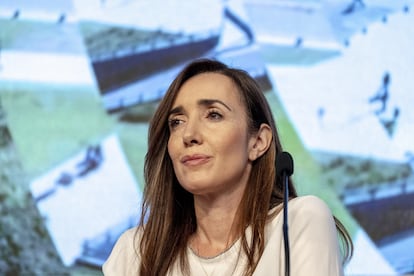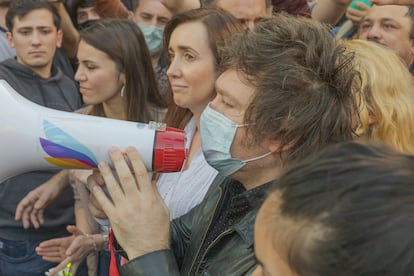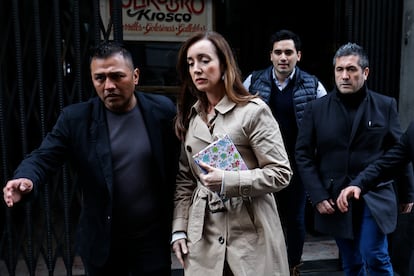Victoria Villarruel, Javier Milei’s running mate who vindicates the dictatorship and opposes abortion and gay marriage
The daughter, niece and granddaughter of soldiers who participated in Argentina’s last military dictatorship (1976-1983), the vice presidential candidate is stirring up the culture wars on behalf of her country’s extreme-right


On December 7, 2021, Victoria Villarruel entered Argentina’s Chamber of Deputies to take her seat. When asked to recite the oath of office during her swearing-in ceremony – customary for all newly-elected legislators – she did so “for the victims of terrorism.”
The 48-year-old lawyer – born into a military family in 1975, a year before the country’s last coup d’état – received catcalls from some of the benches in the chamber. She was well-prepared for this reaction. Now the vice presidential candidate for the far-right coalition La Libertad Avanza (“Liberty Advances”), she has been holding rallies for months, urging Argentines “not to feel ashamed for defending life, liberty and property.” She tells her supporters that they shouldn’t be silent; that they shouldn’t have to ask for permission to express their ideas or values.
A crusader in the cultural battle to transform Argentina, Villarruel is a close ally of Javier Milei, the economist and TV commentator who heads the political coalition. While now a candidate for VP, when she was sworn in two years ago, she was almost unknown to the general Argentine public… although she was a familiar face among human rights organizations and military families. The granddaughter, daughter and niece of members of the Armed Forces, her springboard into politics was a vindication for the victims of the attacks carried out by the guerrillas in the 1970s. Her organization – the Center for Legal Studies on Terrorism and its Victims (CELTYV) – champions the notion of “complete memory.” The inclusion of Villarruel on Milei’s ticket broadened his base beyond the young people who follow him on social media: it now includes members of the most reactionary sector of the right.
The first-born of the marriage of Eduardo Villarruel and Diana Destéfani, Victoria Villarruel was born on April 13, 1975, in the Argentine capital. She was a baby when her father – a member of the Army – was sent to the north of the country as part of Operation Independence. This operation – which began in times of democracy and continued into the dictatorship – was carried out against the guerrillas of the People’s Revolutionary Army (ERP). Unlike other soldiers convicted of human rights violations committed during that operation – considered to be the initiation of state terrorism – Lieutenant Colonel Eduardo Villarreul was never on the judiciary’s radar. However, intelligence officer Ernesto Villarruel – the uncle of the federal legislator – was prosecuted in 2015 for the alleged crime of having illegally detained individuals at the clandestine El Vesubio detention center. In the end, the judge decided not to proceed with the trial, taking into account that he wasn’t in good health.
A conservative revolution
The ticket led by Milei and Villarruel won the most votes in Argentina’s primary elections, which were held on August 13. They garnered almost 30% of the vote. While the polls didn’t anticipate this victory, the duo are now the favorites to win the October 22 general elections. While Milei promises a radical change in the country’s economic policies – with dollarization at the top of the agenda – Villarruel champions a conservative revolution against abortion, sexual diversity and gender equality policies. Over the last few years, Argentina has been at the forefront of Latin America in terms of guaranteeing these rights.

“I defend the right to life, because life begins at conception and – just as I had the right to be born – I want any other human being to be able to have it, regardless of whether they are desired or not. It’s not a question of religion: it’s pure biology. Those who deny it live in an obscurantism that’s costing us innocent lives,” Villarruel responded in writing to EL PAÍS, regarding her anti-choice stance. During the campaign, the candidate has stated that she’s in favor of repealing the law which allows for the voluntary interruption of pregnancy, which was approved in 2020. Yet, she avoids answering – if she indeed manages to repeal the law – if she will seek to criminally prosecute women who still carry out their decision to abort. In the last two years, Argentina’s health system recorded more than 130,000 abortions.
The conservative agenda links Villarruel with Bolsonaro’s movement in Brazil, Trumpism in the United States and with Vox in Spain. “As my dear friends from Vox in Spain say: if you love your country and you dare to say it, you’re called [a fascist]. If you complain about how they suffocate you with taxes, you’re a fascist. If you don’t agree with feminism and with the gender ideology that discriminates between men and women, privileging some over others, you are sexist and – of course – you’re a facist. If you defend your house or your land and demand that the government not let it be squatted on by criminals or Mapuches (Indigenous inhabitants of southwestern Argentina), you’re racist and – of course – you’re a fascist. The progressives imposed the dictatorship of political correctness on us and they look at us from their shaky pedestal of moral superiority, while they silence us,” the candidate declared, at the closing rally of her 2021 campaign.
Villarruel’s ties in Spain were the bridge to connect Milei with Vox. The far-right party welcomed the economist with open arms last October. He reciprocated. “I will always feel comfortable among those who defend freedom against all the threats that loom over it, such as the communism that plagues it,” Milei said, at a festival organized by the ultra-right party on the outskirts of Madrid.
Villarruel’s long, straight hair lacks the prominence of her running mate’s wild hairdo. She applies sober makeup and her gestures are less erratic than Milei’s. But her moderation disappears when she speaks, which has made her the target of numerous criticisms. “Every insult that is said to me – genocidal, fascist, racist, homophobic, [climate] denialist – I receive it all with a smile,” she laughed at a rally.
Security and national defense
If she becomes Argentina’ vice president, Milei has said that he will put her in charge of the portfolios of Security and National Defense. Unlike the cuts anticipated by Milei, in areas such as science, health and education, the candidate promises to expand the military’s budget. The Armed Forces staged six coups d’état between 1930 and 1976. Defunded since the end of the last dictatorship, they have ceased to be a relevant actor in Argentine politics, which, this year, celebrates 40 uninterrupted years of democracy.
Villarruel is seeking the support of the conservative base for her favorite culture war: dynamiting the consensus on crimes against humanity perpetrated by the most-recent dictatorship (1976-1983) and changing the story about the political violence that took place in the 1970s. This fight is centered on language. In her speeches, she rejects “the dictatorship of a single way of thinking” and “the dictatorship of minorities” – and she avoids applying the term to the regime that governed Argentina from March of 1976 until December of 1983. Instead, she refers to it as a de-facto government. “What happened in Argentina was an internal armed conflict, a low-intensity war,” the candidate said at the beginning of 2021, in a discussion about the 1970s that she uploaded to social media. For the legislator, the story told in schools and universities is “partial and distorted,” because it silences the violence carried out by guerrilla organizations, such as the ERP and Montoneros, which were aligned with former president and military strongman Juan Domingo Perón. She also considers the figure of 30,000 missing adults and children – calculated by human rights organizations such as the Grandmothers of the Plaza de Mayo – to be “a myth.”

Villarruel often attacks these organizations and their leaders, who are symbols of the fight for human rights in Argentina. Last week, she verbally attacked the president of the Grandmothers of the Plaza de Mayo, Estela de Carlotto: “The truth is that Carlotto has been a quite sinister character for our country, because – with her kind, granny-like appearance – the reality is that she has justified terrorism.”
Estela Carlotto’s daughter, Laura, was a member of the Peronist University Youth when she was kidnapped in November of 1977. She was three months pregnant at the time. The military detained her in a clandestine detention center, until she went into labor on June 28, 1978. She gave birth while handcuffed on a stretcher at the Military Hospital. The newborn was taken from her and given up for adoption. Laura was murdered two months later and her son grew up in a family that raised him as their own. He did not learn about his true identity until 2014.
“Of course you may feel pain for the death of her daughter… but [Carlotto] doesn’t mention that her daughter was a Montoneros combatant. You could say that everything about Carlotto is an example of the great hypocrisy of the left,” Villarruel sniffed.
Carlotto – now 92-years-old – responded: “I have been fighting and risking my life for 45 years. [The military] wanted to kill me. That’s my life.” About Villarruel, she shrugged. “What this beast is saying makes no sense, because the truth is the truth. She’s not a human being, she’s a beast.”
Meetings with Videla
The candidate for vice president visited former dictator Jorge Rafael Videla – who died in 2013 – when he was imprisoned for crimes against humanity. A member of Argentina’s most-recent military junta, he ruled from 1976 until 1981, the majority of the eight-year-long dictatorship. Villarriel claims that she visited him while conducting research for her books, which gather the names of more than a thousand victims of the guerrillas.
As part of the fine line that she walks, she admits that human rights violations were committed during the dictatorship and says that she thinks it’s good that the crimes were prosecuted. However, she demands that former soldiers be treated the same way as members of the ERP and the Montoneros, the two largest armed subversive groups in Argentina during the 1970s and 1980s. “My family suffered from terrorism, although fortunately without suffering the death of a loved one. But I would like to highlight the story of Arturo Mor Roig – a Spaniard who lived in Argentina. He raised his family here, dedicated himself to politics and was assassinated by the Montoneros in the midst of democracy. Spain never advocated for him… [his case] was never raised, [representing] the discrimination between victims that the Argentine state has carried out,” she affirmed. “I have legally demanded that victims of terrorism [and their relatives] be granted the right to bring terrorists to trial, a proposal that the state has rejected in order to protect their impunity.” Argentina’s judicial system considers the cases that Villarruel has raised to have already been resolved.
Her influence on Milei has become more evident as the months have passed. The presidential candidate for La Libertad Avanza had stayed away from the debate on the number of missing people, but when asked about the subject at a press conference in Tucumán, he coyly replied to the journalist: “Can you show me the complete list of the 30,000 disappeared?”
Last week, Milei attacked center-right presidential candidate Patricia Bullrich – who leads the Together for Change coalition – by using her left-wing past as a member of the Montoneros.
“They’re running a candidate for president who dropped bombs in the 1970s,” he claimed. “I overcame violence,” Bullrich responded. Clearly, Villarruel has managed to place her agenda at the center of the debate.
Sign up for our weekly newsletter to get more English-language news coverage from EL PAÍS USA Edition
Tu suscripción se está usando en otro dispositivo
¿Quieres añadir otro usuario a tu suscripción?
Si continúas leyendo en este dispositivo, no se podrá leer en el otro.
FlechaTu suscripción se está usando en otro dispositivo y solo puedes acceder a EL PAÍS desde un dispositivo a la vez.
Si quieres compartir tu cuenta, cambia tu suscripción a la modalidad Premium, así podrás añadir otro usuario. Cada uno accederá con su propia cuenta de email, lo que os permitirá personalizar vuestra experiencia en EL PAÍS.
¿Tienes una suscripción de empresa? Accede aquí para contratar más cuentas.
En el caso de no saber quién está usando tu cuenta, te recomendamos cambiar tu contraseña aquí.
Si decides continuar compartiendo tu cuenta, este mensaje se mostrará en tu dispositivo y en el de la otra persona que está usando tu cuenta de forma indefinida, afectando a tu experiencia de lectura. Puedes consultar aquí los términos y condiciones de la suscripción digital.








































